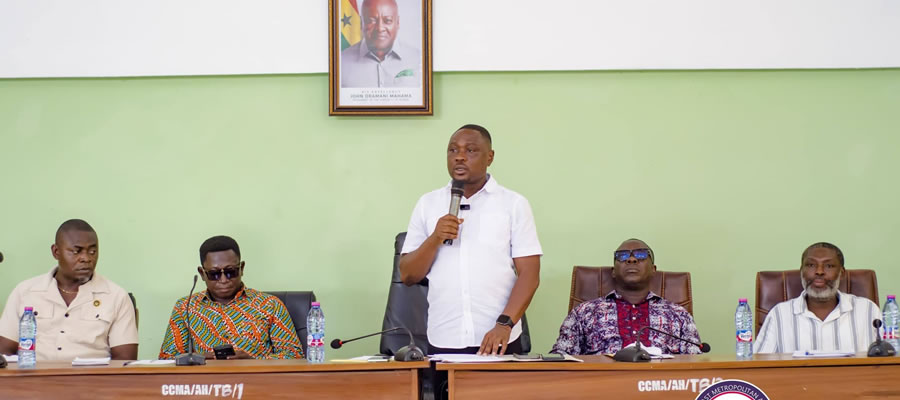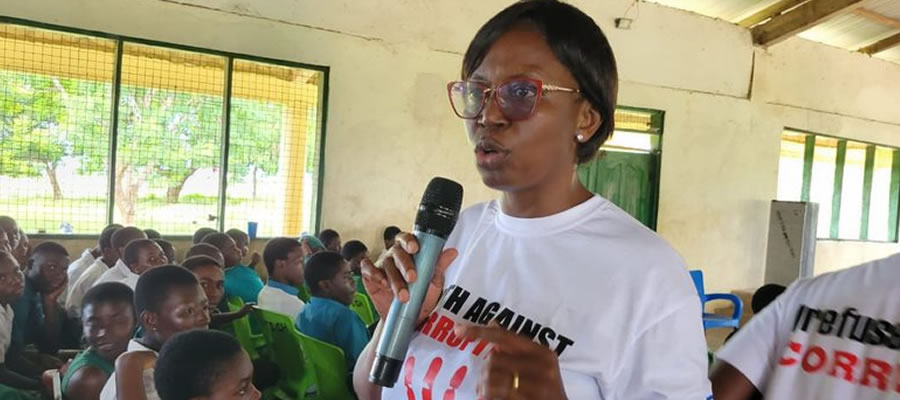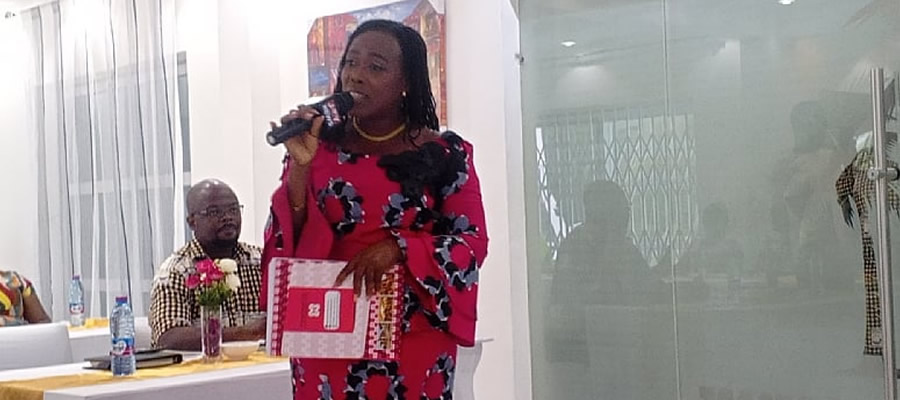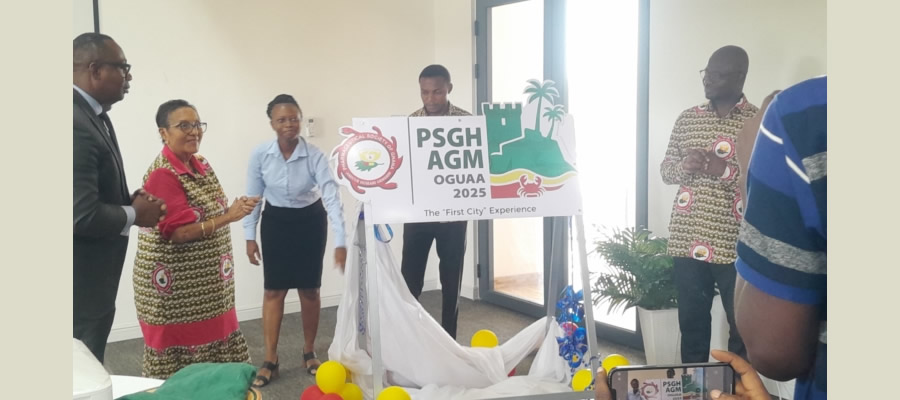

Investment and Business Potentials
The Cape Coast Metropolitan Assembly is an exciting blend of old and new, urban and rural, traditional culture and cosmopolitan culture. This has created vast opportunities for private sector entrepreneurship, which is assured of the full unwavering backing of the Metropolitan Assembly itself.
Despite the relatively urban nature of the metropolis, farming thrives in the northern part of the district, where it is the main source of livelihood, while fishing is a major activity along the southern coastline. The 1984 census indicates that about 10.5% of the economically active population was engaged in farming and fishing.
Major crops cultivated in the district include maize, of which 5,661 metric tonnes were produced in 1996, cassava (1996:36,745 metric tonnes) and cocoyam. Cash crops cultivated in the district include citrus, cocoa and oil palm. All this means that production could be significantly expanded if irrigation techniques are applied.
Since market demand is relatively buoyant for fishing, food crops and cash crops alike, private investors engaging in modern farming and fishing are assured of ready markets for their produce as long as they are offered for sale at competitive prices.
The compact nature of the municipal area and especially its dominance by Cape Coast central markets of Kotoburaba and Kotoka capture the bulk of commodity flows from the hinterland farming communities and part of the coastal fishing communities. Another market at Anofo, also at Cape Coast, controls the fish trade.
Other satellite markets include Abura Market and small selling centres at Adisadel, Kwaprow and Pedu. Apart from Ameem Factory and Pan Saw Mill, there are no significantly large industrial establishments in the municipality.The Ameem Factory is involved in the manufacture of soap and brake bands.
Considering the strong effective purchasing power in the metropolis, this leaves ample opportunity for industrialists to set up shops. Importantly, the area has a huge pool of skilled manpower, complete with technical and engineering skills. There are several small scale enterprises located throughout the municipal area.
These include soap making, oil extraction (coconut, palm kernel and palm oil), garages, quarrying, and services such as sewing, barbering and hairdressing. Entrepreneurs thus have no shortage of raw and intermediate industrial inputs and ancillary support services.
Ghana's Investment Climate
High Ponits of Climate
Ghana with her stable, multi-party democratic environment, a market liberalizing policy, current divestiture programme and ‘Gold Age of Business’ policy declaration by the government have all contributed to underscore her commitment to private sector initiative.
Added to these, is Ghana’s promulgation of the Ghana Investment Promotion Centre (GIPC) Act with transparent procedures, availability of a stock exchange and other emerging financial institutions. Ghana also has quota-free access to the USA and European markets for developing strong private sector advocacy bodies such as the Private Enterprises Foundation (PEF) and the Private Sector Advisory Group.
Coupled with all these is the introduction of monetary and banking sector reforms, and the financial sector adjustment programme which have all contributed to transfer non-performing assets of some state-owned banks to the Non-Performing Assets Recovery Trust to enable banks to recapitulate – leading to reduction in corporate taxes for most business activities.
Role of GIPC
The Ghana Investment Promotion Centre (GIPC) has been established to, among other things, encourage and promote investment in the Ghanaian economy as well as initiate and support measures that will enhance local and foreign investment in the country.
The GIPC’s other functions include to initiate, organize, and participate in promotional activities like exhibitions, conferences, seminars and stimulate investment; and provide as well as disseminate up-to-date information on incentives and support services.
Investor’s Benefits and Guarantees
The range of investment incentives and benefits provided under the GIPC Act 478 (1994) and managed by the GIPC include:-
Customs / import duty administered by the Customs Excise Preventive Service (CEPS);
Tax incentives administered by the Internal Revenue Service (IRS);
Tax holiday for such investors as Real Estate Developers, Rural Banks, Agro-industries, Air / Sea Transport Operators, and Manufacturing Enterprises;
Relief for Investors of unintended obstacles imposed by previous legislation;
Liberalisation of imports and foreign exchange, easy remittance of dividends, profits and fees abroad;
Reduction in company taxes in the manufacturing sector; and
Ghana as a member of the Multilateral Investment Guarantee Agency of the World Bank, provides guarantee against non-commercial risk for investment.
Establishment of Regional Investment Promotion Centre (RIPC) of Ghana
To further enhance its effectiveness and setting up various Regional Investment Promotion Centres to act as its ‘antennae’.
The RIPCs are expected to assist in identifying, coordinating, packaging marketing the investment opportunities and purposefully support the private entrepreneurial projects in the region.
The RIPCs are also charged with identifying viable projects and entrepreneurs. To this end, they are to package the projects into bankable ones and nurture them to a level where they can either stand on their own or be effectively linked up to either backward or forwards with the foreign direct investors either as input suppliers or sub-contractors or in joint venture relations.
Thus, the functions of the RIPCs include:-
To disseminate information on the investment policies, the legal and regulatory framework and the business operating conditions of the country and the region;
To undertake or cause to be undertaken, the identification of District, Municipal and Regional investment opportunities;
To prepare or assist in the preparation of sector profiles and bankable projects for promotion;
To develop and adopt marketing strategies, including fairs and investment for a to promote these sector profiles and projects;
To advise and direct entrepreneurs and project proponents to relevant agencies in and outside the regions for services and the facilitation of their project implement;
To advise the business community in the Region about the source of finance for their projects and the technical assistance packages available for project support;
To identify and encourage the granting of District and Region – specific concessions and incentives to attract investment projects into identifiable locations; and
To serve as the clearing house for all Regional Investment issues and to monitor and evaluate the impact of the investment projects in the Region.
CCMA and the CRIPC
The CCMA in recognition of the anticipated benefits available have set up a Desk Office to handle all issues relating to operationalisation of the Central Region Investment Promotion Centre (CRIPC).
To this end, the Investment Promotion Desk Office at the CCMA have evolved a Cape Coast Municipal Investment priority Plan (CCMIPP), which sees to prioritize critical and strategic sectors and specific Regional locations for special and enhanced concessions and incentives. The rationale is to consolidate the Municipality’s position as the tourism and education gateway to both the Western Region and the rest of the Central Region.
Indeed, the production and distribution of this trade, investment, education and tourism promotion brochure is just the beginning of an aggressive drive being pursued by the CCMA to re-position the Municipality as the most desired alternative destination in the country.
Investor’s Key Facts
All person entering the country must possess valid travel document including passport, laisser-passer and other permits establishing their identity, and issued by international agencies recognized by the Government of Ghana such as ECOWAS, UN and its specialized agencies, the World Bank and the African Development Bank.
Visitors entering Ghana require Entry Visas which can be obtained from a Ghana Embassy, High Commission or Consulate abroad. Where Ghana has No Consular or Diplomatic representation, a Visa could be obtained by an application to the nearest Ghana authorized British Diplomatic Mission or Consulate. Ghana Entry Visas may be issued on arrival if the director of Immigration has prior notification from travelers or their sponsors.
Citizens of ECOWAS countries are exempted from Visa requirements. Kenya, Malaysia, Singapore, Egypt and Hong Kong are special administration regions whose nationals require no Entry Visas. Also free from Visas requirement are holders of German and Cuban diplomatic service passports and persons in direct air / sea transit.
Nationals from the Commonwealth, Eastern and Southern African countries may obtain visas at point of entry in Ghana or Ghana Mission Consulate abroad. Persons wishing to undertake an occupation for reward or employment must be within an authorized immigrant quota zones. All investors to Ghana must register with the GIPC and the CRIPC.
Application for the extension of a visa or automatic quota must be accompanied by a supporting letter from the GIPC and or CRIPC confirming his / her status. On Tax Rebates, the GIPC Act 478 (1994) provides a range of investment incentives, benefits and guarantees to various categories of investors under different taxes. These include a tax rebate of 25% to be enjoyed by manufacturing industries in the regional capitals other than Accra and Tema while 50% will be enjoyed by those outside regional capitals.
For Corporate Tax, all sectors receive 35% except for income from non-traditional export (8%) and hotels (25%). Concerning Income Tax Exemptions, all exemptions will apply for the provision of accommodation for employees on farms, building, timber, and mining and construction sites.
Some Investment Opportunities:
01 Poultry and Poultry Feed
02 Hospitality Industry
03 Fish Cannery
04 Cold Storage Plants
05 Aqua culture Development
06 Establishment of Crafts Village
07 Development of Fishing Harbour
08 Castle Ranching
09 Bee Keeping
10 Snail Farming
11 Mushroom Farming
12 Warehousing
13 Real Estate Development
14 Vegetable Oil Factory
15 Home Financing
16 Cassava Chips Production
17 Cashew Nut Production
18 Black Pepper Production
19 Citrus Juice Factory
20 Cassava Flour Production
21 Sweet Potato Production
POCC
Identification of Potentials, Opportunities, Constraints and Threats within the Zonal Council
The communities were guided to identify their potentials based on the above problems of their respective communities which were thereafter put together into a Zonal one. The analysis of potentials, opportunities, constraints and threats is presented here to give insight into the nature of problems that can hinder development and need to be addressed and the opportunities and resources available to the Municipality that can be harnessed to solve the identified problems.
Opportunities / Constraints
The myriad of problems as outlined notwithstanding, the Municipality has some important resources that could be developed given proper management. For example, with adequate land and water management it should be possible to step up vegetable cultivation in the rural fringes to feed the urban market. The area also has the Cape Coast Cattle, designated by UNESCO as World Heritage Site, which is an important link in the historical development of this country.
The emphasis on tourism development as the lead sector in the development of Cape Coast in recent years has seen a steady increase in the number of visitors. However, this increase is not matched by the appropriate inflows of financial resources. Most tourists stay in hotels in Accra and only come to the area to use the tourism resources. While new hotels are springing up, the quality is still below those in other parts of the country.
The area also has a Fort, a Lighthouse, historical buildings, tombs of historical importance, Asafo Shrines (Posuban), as well as excellent beach fronts and other water bodies, wetlands, Ostrich Farm, Crocodile pond at Hans Cottage Botel, Monkey Sanctuaries, which are important tourist attractions. Metropolis should be in the position to derive maximum benefits from this. Conscious efforts need to be made, by developing these other attractions, to ensure that Tourists to Cape Coast stay, at least overnight, so that local economy could gain from the tourism assets in the Metropolis in particular, and the industry as a whole. The state of environmental sanitation and personal hygiene needs improvement to offer further attraction to the visitor.
The area also has large deposits of kaolin located at Ekon which could form the basis of a paint industry. There are also possibilities for the setting up of stone quarries to the north of the municipality. Currently, quarrying is taking place on small scale basis but there is the need for expansion of capacity to meet the construction needs of the municipal area.
Agro-forestry has the potential to become an important source of income and employment as well as an avenue to reduce the incidence of environmental degradation, which is becoming a serious problem. There are numerous wetlands many of which can be reclaimed through planting fast growing tree species such as the acacia. The trees can then be used for fuel wood to reduce the present dependency on the natural vegetation. It will also generate income for small scale farmers.
Even though Cape Coast has become a centre of limited economic importance, in recent times, mainly servicing the needs of its direct surroundings, it remains as one of the largest traditional fishing centres in Ghana. Together with Elmina, Kakum National Park, and its peripheral attractions, Cape Coast is a nucleus in the Central Region tourism development, with cultural heritage, beach tourism, and small-scale nature reserves as main assets for development. The region and the Municipality are relatively successful in this development, yet few of the benefits of tourism actually reach the local population and the local administration.
With adequate land and water management it should be possible to step up vegetable cultivation in the rural parts of the Municipality to feed the many hotels in the Metropolis. In addition, fish landing facilities could be improved to help increase the catch and enhance the incomes of the many people who are dependent on the industry.
In terms of funds for development projects, the Cape Coast Metropolitan Assembly is less endowed with financial resources. For instance, revenue generated from own sources (IGF) was ¢8,005,369,800.00 (¢12,132,566,363.00 targeted) and ¢10,255,923,532.60 (¢14,096,938,027.00 targeted) in 2004 and 2005 respectively, which is not adequate, given the vastness of the Municipality and the required investment in social services. It has to be mentioned that in the 2004 and 2005 the Common Fund allocation to the Municipality share was ¢4,815,000,000.00 and ¢5,565,000,000.00 respectively.
Allocation for the year 2006, the start period of this plan on the order hand was ¢6,236,000,000.00. Whilst the central government grant provides a huge source of revenue for developmental purposes, especially with the coming into being of the Common Fund, it also acts as a constraint if, for any reason, it fails to provide similar higher levels in the future. Planned development projects could easily be derailed unless the Municipal Assembly steps up its internal revenue generation efforts.
Financial institutions
The Metropolitan area has a wide range of banking facilities. These include all the major commercial banks in the country, namely:
The Barclays Bank of Ghana Limited,
Ghana Commercial Bank Limited,
Standard Chartered Bank Ghana Limited,
SG-SSB Bank Limited,
Agricultural Development Bank Limited,
National Investment Bank as well as
The Kakum Rural Bank.
Date Created : 11/16/2017 4:17:15 AM













 facebook
facebook
 X
X
 Youtube
Youtube
 instagram
instagram
 +233 593 831 280
+233 593 831 280 0800 430 430
0800 430 430 GPS: GE-231-4383
GPS: GE-231-4383 info@ghanadistricts.com
info@ghanadistricts.com Box GP1044, Accra, Ghana
Box GP1044, Accra, Ghana